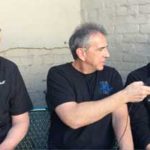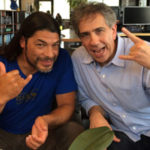Seasoned British bassist reflects on the highs and lows of a long and varied career
By David Sands
March 18, 2015
Famous for his steady rhythms on unforgettable Blondie hits like “Rapture” and “Heart of Glass,” the well-traveled Nigel Harrison has covered a lot of musical terrain over the course of his career.
Working with groups like the Grabs, Chequered Past and, of course, Blondie, the English bassist has explored elements of funk, country, disco, metal and reggae in his playing while keeping a grounded connection to his rock and roll roots.
Lately Harrison has come full circle, bringing his nimbly intuitive playing to a new album by Michael Des Barres, the British rock vocalist and actor who helped him make a name for himself with the glam rock outfit Silverhead in the 1970s.
FBPO’s Jon Liebman caught up with Harrison recently to find out about his life in music, including recent bumps in the road with Blondie, as well as his equipment and the new Des Barres album, The Key to the Universe.
Harrison is the sort of player who’s always trusted his instincts. He doesn’t read music and uses the phrase “zero musical education” to describe his formal training.
At times this has impeded his ability to perfectly duplicate bass lines at recording sessions, but he’s happy with the spontaneity he delivers as a tradeoff.
Not one to mimic other players, Harrison names Jack Bruce of Cream and legendary session musicians Donald “Duck” Dunn and Carol Kaye on a short list of inspirations. Early Motown also left an impression with him, as did Canned Heat’s bassist Larry “The Mole” Taylor.
“When they would do shuffle blues, Canned Heat, I just used to play along with those records,” he says. “Not to copy the riffs, but just that feel. There’s nothing better to me than playing shuffle blues, as a bass player, when you can do the walking lines and just hold it down.”
As for his equipment, Harrison keeps it simple: a Fender with RotoSound strings hooked up to a Marshall.
“Fender bass and the Marshall amp for rock,” he says. “That’s it. It’s the sound of the Seventies. It’s the sound of Motown. It’s the sound of Soul. That’s the setup, isn’t it?”
Every bass player has an origin story; Harrison believes his was an act of destiny.
Growing up in Stockport, England, Harrison came to music in the mid-sixties, when the Yardbirds and the Who were starting to turn heads. Like a lot of young men, he thought playing a guitar would impress the ladies. Eager to do that, he sent away for one in the mail.
“Two months go by—nothing—and my mother says, ‘I told you they’ll steal your money,’” he says. “Eventually the postman shows up on a winter’s morning in the snow with this brown box. I open it and inside is a bass guitar. I wanted a six-string, and I ended up with a Vox Clubman bass.”
As the only one with a bass in his circle of friends, he naturally picked up the instrument.
After playing for a while with a local band, Farm, Harrison moved to London. There he found music gigs by combing through the pages of Melody Maker. His lucky break came pursuing a curious advertisement that read: “Erotic Relaxers Requires Bass And Drums.”
The ad’s bizarre title ended up being a misprint, but led Harrison to an audition in London’s Leicester Square. Michael Des Barres, who was then appearing in a play called The Dirtiest Show in Town, wanted to start a rock group and convinced composer Andrew Lloyd Webber and lyricist Tim Rice to bankroll him. Out of this desire, Silverhead was born.
“Michael, I’ll always be indebted to him, because he literally picked me out of a crowd of bass players,” Harrison says.
“Within a couple of months, we were signed to Deep Purple’s record label,” he adds. “Our first gig in the U.S. was at the Kennedy Center opening for Deep Purple. What a way to start, right?”
After Silverhead, Harrison would go on to play with famed Doors keyboardist Ray Manzarek on a solo album and as part of the supergroup Nite City.
He joined Blondie in the wake of their “Plastic Letters” record. During the recording of their classic Parallel Lines album, the rock and roll bassist butted heads with Australian producer Mike Chapman. Although he now gives Chapman credit for his insightful contributions, back then Harrison found it difficult to come to terms with his demands for a stripped-down no-frills performance.
“There’s a Blondie song called ‘11:59’ off Parallel Lines. It’s quite an epic thing—a lot of chord changes,” he says.
“But each time a change would come around, I would do a different walking line, because I was just doing what I felt—being spontaneous,” he continues. “And the track would stop, and Mike would say on the talkback: ‘Roll back the tape.’ I’d go: ‘Mike, Mike, please, please, just keep that take, and then he’d go: ‘Why am I keeping it, if it’s not the one?’ And the tension in the studio just drove me nuts.”
As for the clash that took place at 2006 Rock and Roll Hall of Fame between former and current Blondie bandmates, Harrison calls the situation “criminal” and “ridiculous.” At the induction ceremony, Deborah Harry spurned a request for him and Frank Infante to perform, a move Blondie guitarist Chris Stein linked to legal squabbles.
“We were definitely ready to play, but it just got ugly real quickly, and the strange thing is we’re all in business together. We still have a corporation together,” he said. “I wish I could turn back time and change that somehow. Things would be different. It’s kind of sad.”
In the years following Blondie, Harrison performed and recorded with Chequered Past, an all-star rock group that included Des Barres, former Blondie comrades Infante and Clem Burke, ex-Sex Pistol Steve Jones and Tony Sales.
More recently, he’s recorded two albums with the Grabs, a folk-tinged indie rock band, fronted by singer-songwriter Eleni Mandell, and has been playing with The Rua, a classically-charged pop group based in Windsor, England.
As for his recent collaboration with Des Barres, Key to the Universe, Harrison can’t say enough about the experience.
Along with the singer and himself, their high-voltage rock album features respected session drummer Clive Deamer and guitar maestro Dani Robinson. They came together at Rome’s Forum Music Village to forge the recording from scratch.
“We literally went in there with no songs,” he says. “It was great. We could’ve gone on forever.”
The bassist attributes the album’s exuberant energy to the Forum’s spacious accommodations and producer Bob Rose’s microphone skills.
“We did it like the old days,” Harrison says. “We had the drums in the middle of the room. It’s an enormous, cavernous ceiling. A lot of the tracks, we didn’t have headphones.”
“Once we were inspired by that incredible sound, it just made it so easy to cut the tracks,” he adds.
Recorded in analog, Key to the Universe features ten songs, including the provocatively titled “I Want Love to Punch Me In The Face.” It will be available from FOD Records in April 2015.
Michael Des Barres on The Key to the Universe








I say this as a fan of Nigel’s work and as someone who thought Blondie lost something special when he left, but if I had just walked into an existing band and the producer was Mike Chapman and he had me doing different stuff and doing take after take, I don’t think I’d be doing any arguing. I also thought that Nigel and Frank ambushed Debbie and Chris at the RRHOF, which is a bush league move. Not trying to say this with any animosity as I’m sure Mr. Harrison is a decent upstanding person, and I can’t pretend to know what it was like playing in Blondie, but maybe the fault wasn’t in Debbie and Chris?
Oh, it was definitely Chris & Debbie’s fault. Stein is a head case and Harry ‘s ego is off the RIchter Scale.
I am a long time fan of Blondie. Trust me, Nigel, your writing and playing on their body of work was wonderful, at the pinnacle of their amazing-ness.
And…BASS LINE! (Chapman unexpectedly demanded of you while recordiung “Atonmic”, and you delivered, boy!).
There was no good reason why Nigel and Frank were not allowed to perform at the RRHOF. When Heart was inducted, Ann & Nancy Wilson performed with their original bandmates and their current ones. Debby and Chris not allowing their former bandmates Nigel and Frank to play was bush league.